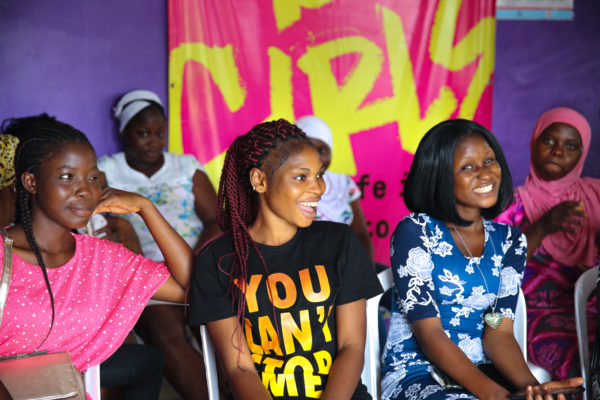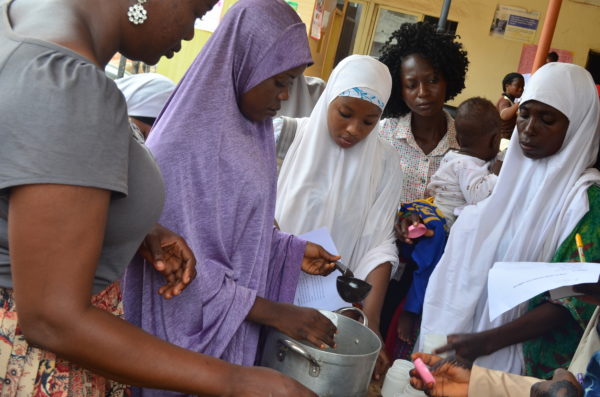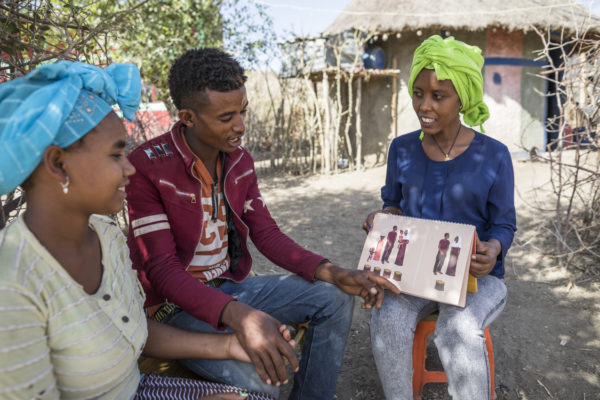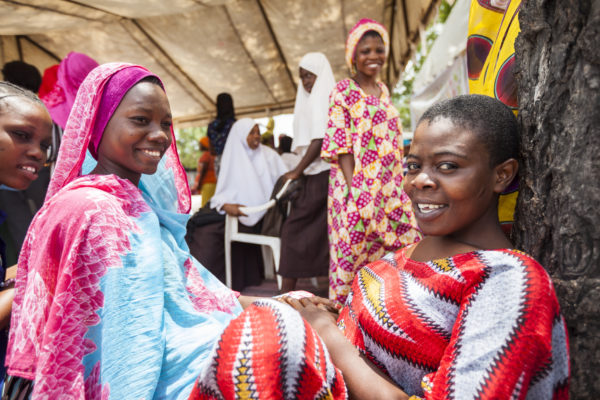Doreen is busy texting on her red Samsung as the 30 girls go around the room introducing themselves to the group gathered in the Safina Clinic in Dar es Salaam, Tanzania. Her friend Warda was supposed to meet her here but she hasn’t shown up.
Her mother, Alice, didn’t tell her why exactly she was handing her an invitation a few days earlier with a green pineapple printed on it for an event the clinic was holding. Something on Saturday morning called Kuwa Mjanja (“Be Smart” in Swahili). Doreen knew it was for girls, and expected something like the other programs her mother had sent her to where she learned entrepreneurial skills like making soap and plaiting hair.
Doreen sat up straighter when Rose, the 22-year old group leader told the girls at the clinic they were there to have a “safe space.” Wearing a gray t-shirt with a blue pineapple, Rose said they would talk about the changes they were seeing in their bodies and be free to ask all the questions they had.
Doreen placed the phone on the bench next to her and didn’t look at it again.
Through the Adolescents 360 (A360) project, PSI, alongside a consortium of partners, is working to increase voluntary, modern contraceptive use among girls age 15-19 in Ethiopia, Nigeria and Tanzania. Among the many approaches A360 is piloting are separate clinics for mothers and daughters.
They start with the mothers. Alice and others gathered on Tuesday to hear from clinic nurse Maria exactly what she’d be telling their daughters on Saturday. Kuwa Mjanja was a program designed especially for girls, where they could learn about the changes going on in their bodies, how to prevent pregnancy, get their questions answered and talk with other girls.
The mothers learned the symbolism of the Kuwa Mjanja logo, “Pineapples stand tall—they are proud! They wear a crown, like a queen who knows her worth and demands respect. And even though they are tough on the outside, they are beautiful and sweet on the inside. Just like our daughters.”
During the girl’s session four days later, the daughters start by talking about their dreams in life. What do they want to be? Rose asks.
“A nurse.”
“A teacher.”
“A doctor,” Doreen says.
“President,” one girl answers and everyone cracks up.
Rose and Maria spend the next 20 minutes engaging the girls about the topics they’re there for: hygiene, menstruation, and family planning methods.
Rose asks the group, “What do you know about getting your period?”
“It is when you start to bleed at the end of every month when you begin puberty,” Doreen volunteers.
The girls are shown how to use a sanitary napkin, complete with full demonstration begun by taking it out of the wrapper and ending with folding the sticky wings around the underpants to hold it in place. Knowing that disposable pads are an unaffordable option for many girls, they also learn how to use a cloth instead. Wash it with soap and clean water and dried in direct sunlight so it doesn’t grow fungus. (If you’re shy, you can drape a cloth over the sunny clothesline so people don’t see it.)
Maria walks through the family methods available to them: male condoms, female condoms, pills, implants IUDs and Plan B bill.
Then Rose hands out paper and each girl writes down her question, without including their name. Rose urges them to be as open as they want, telling them “Everyone hears different things. This is why we’re all here. To learn.”

Kuwa Mjanja is the chance to get answers to all the things they’re curious about. Rose reads out the questions and answers each in turn:
What is going on in your body when you bleed each month? Do boys go through puberty? Why does your stomach hurt when you have your period?
There are lots of questions about pregnancy–how to prevent it and what are the downsides of using family planning.
“After having sex, can you use a method and stop from getting pregnant?” Rose reads from one piece of paper.
“No,” nurse Maria answers. “If you use a method after you get pregnant, it won’t work.”
Rose unfolds another piece of paper and reads: “Can you tell me the risks of using family planning?” Doreen later tells me that was her question.
Many girls have written similar ones. “Which method is most risky?” “When you use pills, won’t they affect you later when you want to have a baby?” “Can getting an injection cause you not to get pregnant later?”
“There is no method that is unsafe,” Maria reassures them repeatedly. “Using family planning doesn’t mean you won’t be able to give birth later. There are some side effects which are very small.” She tells the girls she’ll go over all that in the one-on-one consultations she’s holding afterwards. If they choose a method, it will be free on that day.
“How do you use a condom?” Rose reads out. Maria tells the girls she can’t show them there. But she’ll show them individually when they come to her exam room.
Rose wraps up the session and asks the girls about what they’ve learned. Then whoever wants to meet with the provider should raise their hand.
Doreen meets with Maria and chooses three months of oral contraception. Her friend Warda (who eventually came 20 minutes late) does as well. Doreen says she does not like injections (and laughs when she says she cannot even imagine how the doctor would get the IUD she held up during the demonstration inside her).
Doreen says she isn’t really interested in boys since she and her 25-year-old boyfriend Harmony broke up six months ago. They’d dated for a year. When they had sex, they used condoms. Her friends had told her that other family planning methods were only for women who have had babies. Not for young girls like her.
Now she’s focusing on her studies. She went through a rough period where she didn’t take school very seriously, she says. She’s studying to retake the Form 4 test so she can go to the university.
Eventually, when has a job–and hopefully fulfills her dream of becoming a doctor–Doreen would like to have a family. “Four kids.”
She’s confident that Maria gave her the right information. Family planning is safe.

Adolescents 360 (A360) is a four-and-a-half year initiative co-funded by the Bill & Melinda Gates Foundation and the Children’s Investment Fund Foundation (CIFF). The project is led by Population Services International (PSI) together with IDEO.org, University of California at Berkeley Center on the Developing Adolescent, the Society for Family Health Nigeria, and Triggerise. The project is being delivered in Ethiopia, Nigeria and Tanzania, in partnership with local governments, local organizations, and local technology and marketing firms. In Tanzania, A360 is building on an investment and talent from philanthropist and design thinker Pam Scott.





